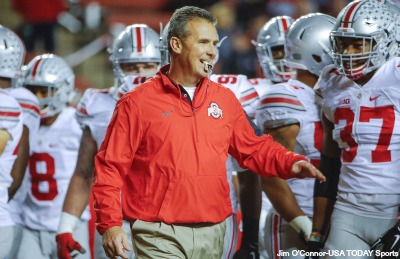Urban Meyer would like you to believe he's doing the noble thing with J.T. Barrett. After the Ohio State quarterback was arrested on a charge of operating a vehicle while intoxicated, the coach suspended him for the upcoming home game against Minnesota -- a game he would have otherwise started.
After reviewing the details of the arrest, Meyer then decided additional punishment was required. He decided that Barrett would forfeit his scholarship for the upcoming summer semester, forcing him to pay his own way.
"I tried to collect as many facts as I could about what actually happened," Meyer said. "I meet with the player; I meet with [Ohio State athletic director] Gene Smith. Obviously this was a very serious one. I came to the conclusion of one game, and he's also losing a scholarship, forfeiting his scholarship for a term.
"When a kid has an issue like that, there's some type of punitive damage."
He said all the right things, but the punishment itself misses the mark. Meyer's decision to have Barrett forfeit part of his scholarship, instead of missing additional football games, may be a welcome resolution for fans, who don't have to face the prospect of missing Barrett for the November stretch. But it also shows how the Buckeyes concern themselves more with the football field than with a player's personal well-being.
The lost scholarship is a big one. Barrett, who went to high school in Texas, would have to pay out-of-state tuition, which could run him around $10,000 for the summer semester, depending on his course load. He'll have to pay out-of-pocket or sit out from school over the summer.
Essentially, Ohio State using scholarship funds as a way of "fining" its players -- a convenient little loophole that opens up all kinds of problems. Why is a college football coach, for example, able to wield money as a form of punishment? Why, instead of simply causing the player to miss additional football games, is Meyer creating financial stress for amateur athletes and introducing barriers to them taking classes -- and perhaps, in certain situations, piling on to the challenges of getting a degree?

It's easy to draw a conclusion here: This is the form of punishment that least affects the team. Barrett only misses one game, against Minnesota, and returns in time to face a better-than-expected Illinois program. Whether Barrett or Cardale Jones starts -- Meyer has said he isn't sure whether Barrett will return to the starting role after his suspension -- the quarterback's presence will be invaluable to the team's depth at an already troubled position.
In one sense, you don't want other players, who did nothing wrong, to suffer from Barrett's absence. But accountability is an important part of sports, and it extends far beyond how well you block for your teammates. Preaching a message of accountability within a football program can be an effective form of maintaining a strong team culture, one that helps police itself. Judging from Florida's culture struggles in the wake of Meyers' departure from that program, managing player behaviors -- off the field in particular -- is an area where he could do much better.
This subjective stripping-away of scholarship money is also another strong argument for why student-athletes need a union to protect their interests. Barrett has little recourse here, especially if he wants to remain in his coach's good graces, and no other authorities are going to step up and advocate for better or different treatment. And for what it's worth, Barrett may prefer the scholarship loss to missing more football games.
But this isn't about what Barrett wants, nor is it about what Meyer wants. Ohio State needs to do what's best for the student-athlete, and playing games with scholarship money is an ugly ploy.
Meyer and the university need to see this form of punishment for what it really is: An excessive fine on a student likely living below the poverty line.






























